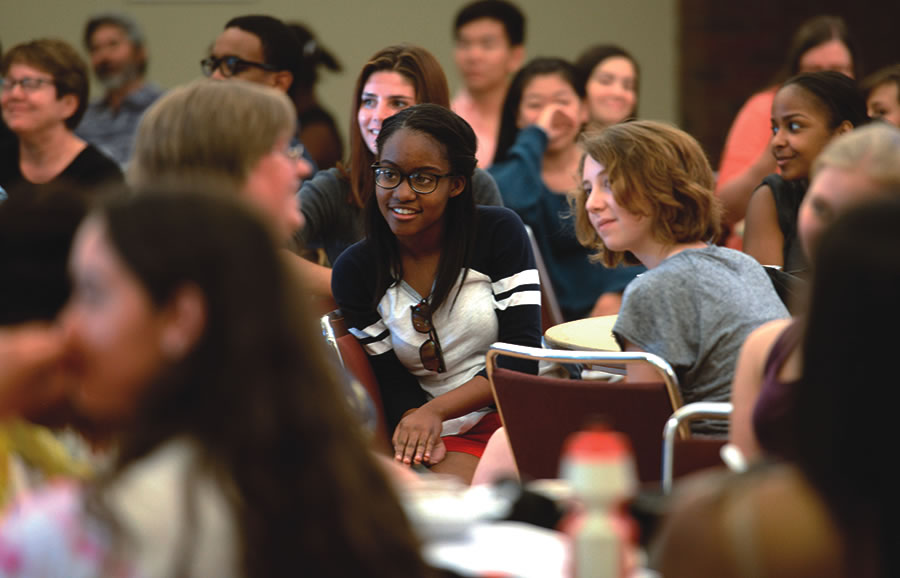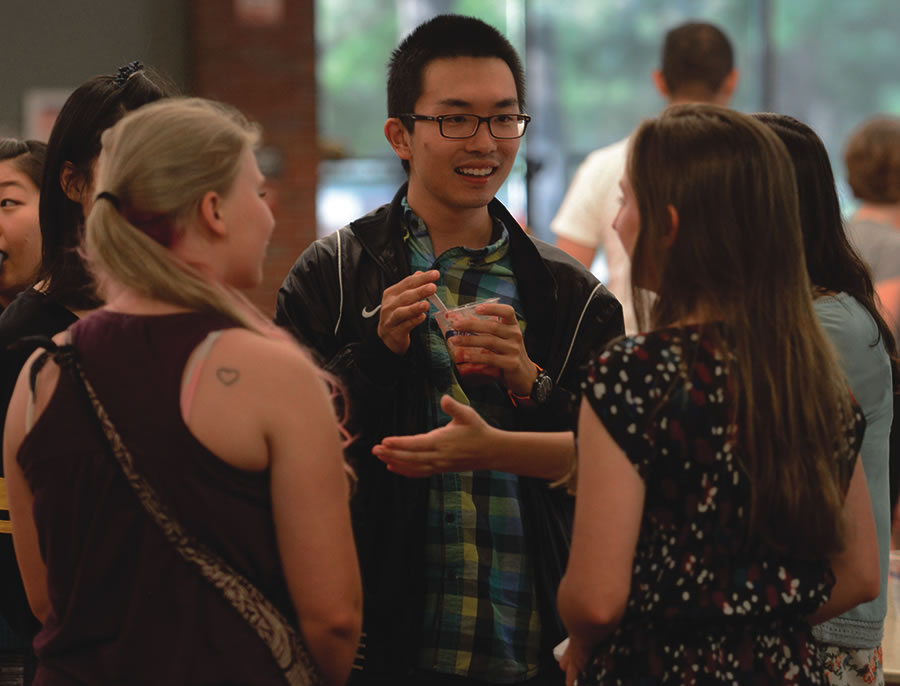This summer, 55 first-year students started their intellectual adventure at CC with the Bridge Scholars Program — a yearlong college transition program based on the most recent research in education and psychology. The program started with two weeks of intense coursework, followed by collaborative programming by the Dean’s Office, The Butler Center, and student mentors.
The objective of the program, according to Emily Chan, associate dean of academic programs and strategic initiatives, is to give students a “running start” on claiming and building their CC experience.
“We invite them to have a taste of the Block Plan before their First-Year Experience to whet their intellectual appetite, and engage them with co-curricular programming that empowers students,” Chan said.
Two weeks before the start of New Student Orientation, the Bridge Scholars started the program with one of four half-unit courses: The Culture and Scientific Construction of Identity: Food, Chemistry, Culture (Professors Habiba Vaghoo and Mario Montaño), Biological and Mathematical Analysis of HIV (Professors Ralph Bertrand and David Brown), Different Looks at Inequalities: Race, Society, the HIV Epidemic, and Economic Growth (Professors Pedro de Araujo and Paul Buckley), and Truth with Curlicues: Comedy and Culture (Professors Heidi Lewis and Scott Krzych). To read about the courses in-depth, go to: www.coloradocollege.edu/other/bridge/courses.dot.
Chan explained that these courses were “designed to provide students with an intense academic experience that models the critical and interdisciplinary discourse in the liberal arts classroom.” The intimate faculty-to-student ratio (1:7) “allows the professors to challenge and support each student to grow and stretch,” she said. Students also worked with the Colket Learning Center to improve their writing, quantitative reasoning, and oral communication.
“Peer mentors play an important role in the program too,” said Chan. This summer, the mentors went through an 18-hour curriculum to develop their mentoring skills. “They hold regular meetings to discuss topics of interest with first-year students, they organize activities for the Bridge Scholars to learn about college life and student activities, and they help students build a close-knit community of supportive peers.”
Bridge Scholar Nancy Osazuwa ’18 said she liked how the program was designed to provide a sense of comfort and support.
“The mentors did a really great job of helping us inside and outside of class. Even now that Block 2 is here, whenever I have a question I just text or talk to them and they are super supportive. I have grown so close to the people from Bridge, and even though I have many friends outside of Bridge, it is nice to see other Bridge scholars who triumphed with me through the summer program,” Osazuwa said.
Bridge mentor Esther Chan ’16, who participated in the Bridge Program herself when she was an incoming first-year student, said the Bridge Scholars find a family, support system, and network of caring individuals before school even starts.
“The Bridge Scholars Program is an invaluable experience that connects students to our boatload of resources on campus and empowers them to take all of the opportunities as they come. I think this experience brings a little bit of comfort before the school year starts, and even more than that, a little bit of excitement to take on all that CC has to offer,” Chan said.
“Mentoring for the Bridge Scholars Program is the best thing I do on campus. This job requires me to wear many hats; I’m a mentor, an advisor, an intermediary, and a friend. I remember the influence my mentors had and still have on my life. They are my role models, I look up to them, and I rely on them for wise words of wisdom, hugs, and comic relief. I hope that my mentees can see me in this way, too.”
An exciting addition to the newly envisioned program this year, said Emily Chan, was an innovation workshop done in collaboration with the Innovation Institute. In a condensed form of a “start-up weekend,” students went from brainstorming ideas to learning how to validate their innovation, to designing a strategy, and finally to delivering their pitch on the second evening. Vying for $1,000 of start-up seed funds to kick-start their innovation, students delivered their 10-minute pitches on innovative ideas including: creating a “find my friends” safety app for smart phones, starting a campus bicycle rental company, and designing bottle caps with LEDs that convert water bottles into camping lanterns.
“The Admission Office helped us identify students who are first-generation college students or who are from high schools that provided limited options for advanced course work. Once we receive the list of potential Bridge Scholars, the Dean’s Office committed to fully funding their participation in the program,” Chan said.
The participating scholars receive free tuition for the half-credit course, room and board for the two weeks, along with a $200 book credit at the CC Bookstore to help offset the two weeks of summer wages they lose.
The Bridge Scholars Program continues to support the students in a variety of ways throughout the school year. Faculty advisors and mentors have been working closely with students to advise on first-year course selection. Bridge Scholars ventured with their mentors to Denver to visit the Dale Chihuly exhibit at the Denver Botanic Gardens. They networked with Denver alumni over dinner, learning bits of wisdom from alumni who generously shared memories about the people and places at CC that shaped their transition from high school to college, just a few years (and decades) ago.
Bridge Scholar Trevon Newmann ’18 said his Bridge experience was not only a great introduction to academic and social life at CC, but it was also fun.
“After I went through the summer Bridge program, I had a really good understanding of the academic and social atmosphere on campus. I see my mentor all the time, and I often have questions that I can ask, so it’s really great.
“[In the two weeks] there was really not a dull moment. We explored Colorado Springs, did some hiking at Garden of the Gods, and went to Manitou Springs. And we got to do all this before the school year even started. It was so much fun!” Newmann said.
Emily Chan said the future holds many possibilities for growing the Bridge Scholars Program. She would like to expand the duration so students can delve more deeply into community engagement and leadership development. Another goal is to increase the stipend for students to help offset their lost summer wages. Chan also would like to continue strengthening the full-year programming.
Chan said the college welcomes alumni involvement in the Bridge Scholars Program on many levels: financial support for this program so that it’s completely free to the students, as well as advice and mentoring from alumni to create a network to help students navigate the college landscape in ways academic, professional, and personal.
“It takes a village, and that’s what we are committed to building for the success of the Scholars,” said Chan.

